Organizational Culture and Motivation
VerifiedAdded on 2020/12/09
|15
|4975
|238
Report
AI Summary
This assignment delves into the concepts of organizational culture and motivation in the workplace. It examines Handy's Model of Organizational Culture, exploring its four distinct types: Power, Role, Task, and Person cultures. The assignment also analyzes Maslow's Hierarchy of Needs as a motivational framework, outlining how employee satisfaction is influenced by the fulfillment of various needs. Using provided references, students are expected to demonstrate their understanding of these theories and their practical implications in managing employee behavior.
Contribute Materials
Your contribution can guide someone’s learning journey. Share your
documents today.
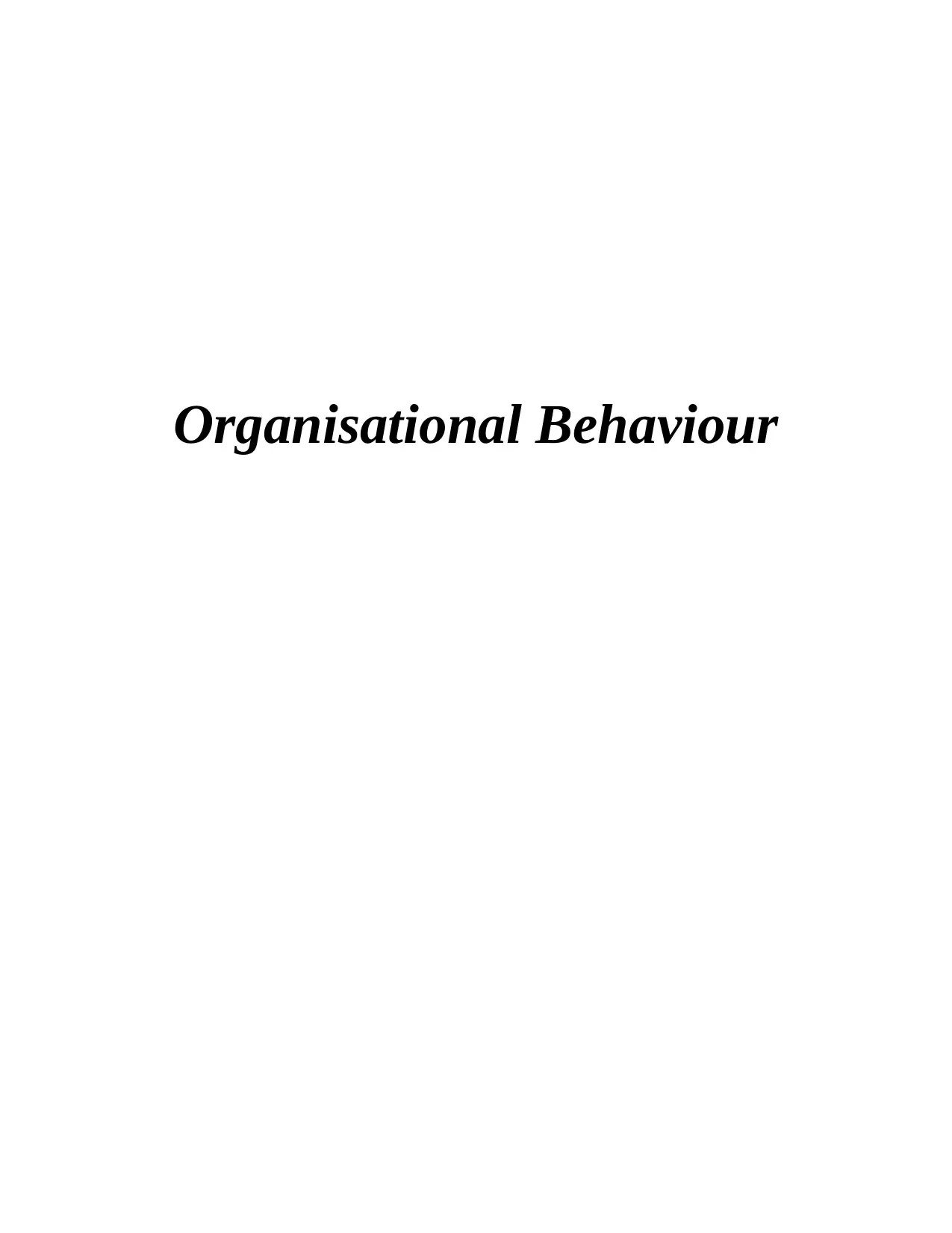
Organisational Behaviour
Secure Best Marks with AI Grader
Need help grading? Try our AI Grader for instant feedback on your assignments.
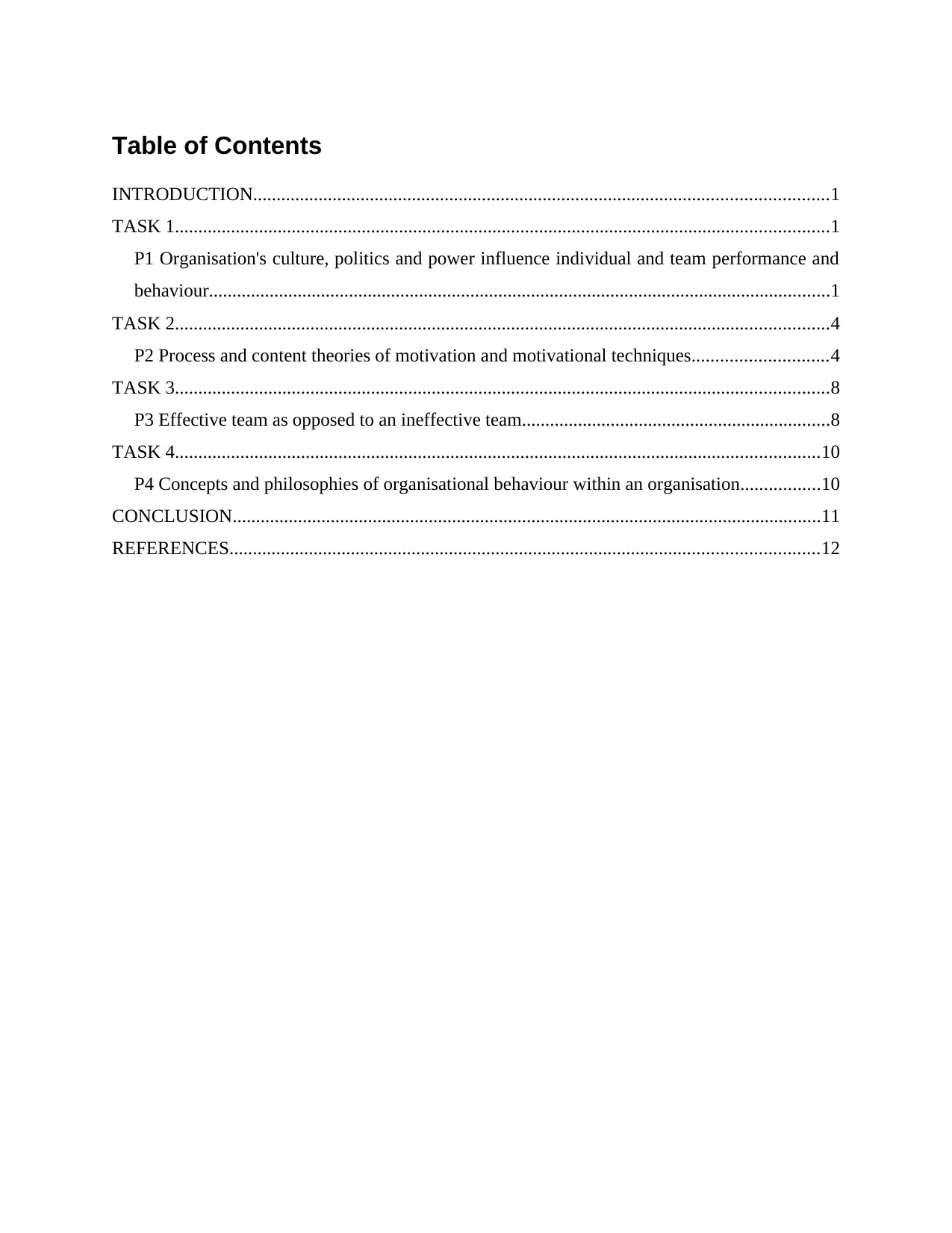
Table of Contents
INTRODUCTION...........................................................................................................................1
TASK 1............................................................................................................................................1
P1 Organisation's culture, politics and power influence individual and team performance and
behaviour.....................................................................................................................................1
TASK 2............................................................................................................................................4
P2 Process and content theories of motivation and motivational techniques.............................4
TASK 3............................................................................................................................................8
P3 Effective team as opposed to an ineffective team..................................................................8
TASK 4..........................................................................................................................................10
P4 Concepts and philosophies of organisational behaviour within an organisation.................10
CONCLUSION..............................................................................................................................11
REFERENCES..............................................................................................................................12
INTRODUCTION...........................................................................................................................1
TASK 1............................................................................................................................................1
P1 Organisation's culture, politics and power influence individual and team performance and
behaviour.....................................................................................................................................1
TASK 2............................................................................................................................................4
P2 Process and content theories of motivation and motivational techniques.............................4
TASK 3............................................................................................................................................8
P3 Effective team as opposed to an ineffective team..................................................................8
TASK 4..........................................................................................................................................10
P4 Concepts and philosophies of organisational behaviour within an organisation.................10
CONCLUSION..............................................................................................................................11
REFERENCES..............................................................................................................................12
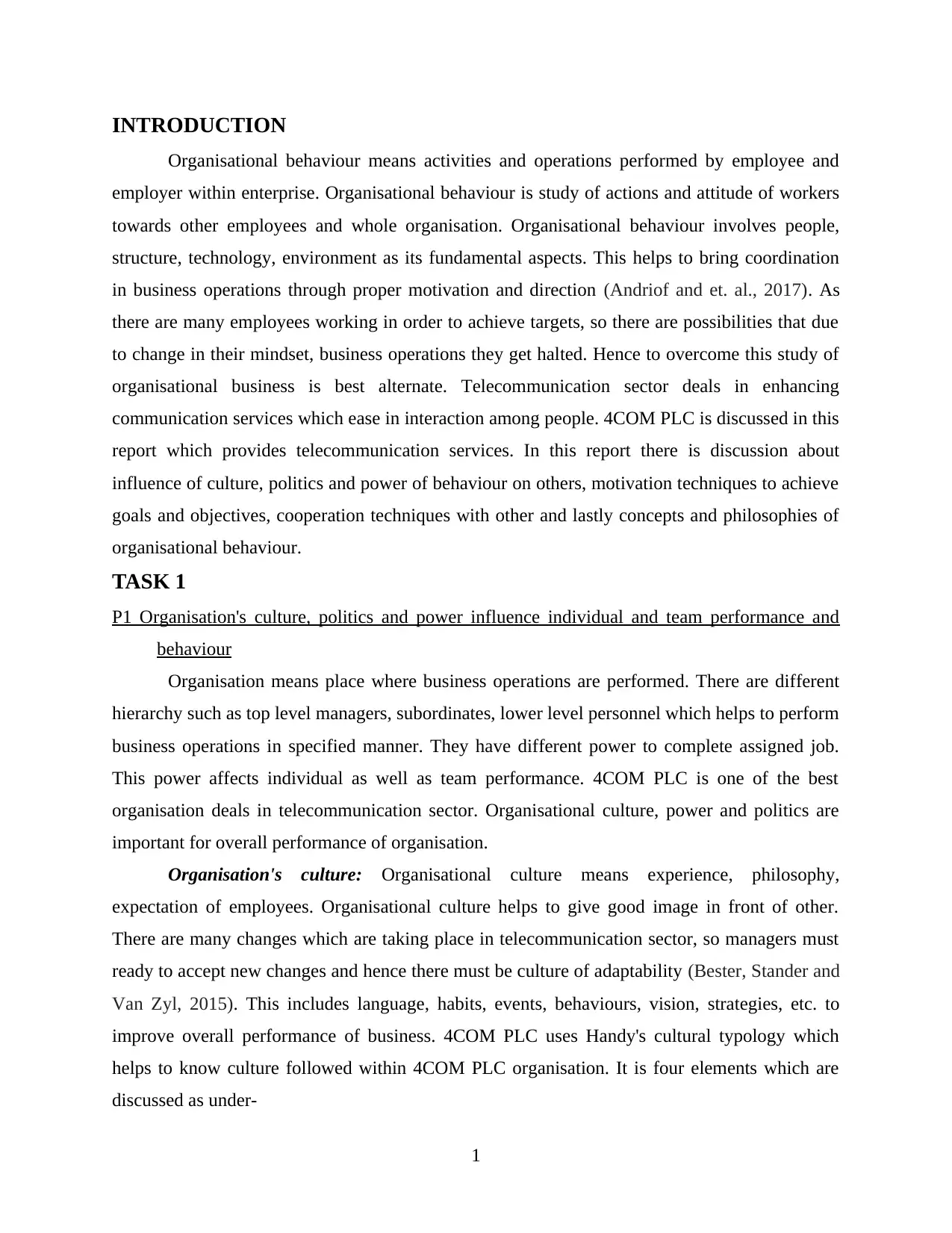
INTRODUCTION
Organisational behaviour means activities and operations performed by employee and
employer within enterprise. Organisational behaviour is study of actions and attitude of workers
towards other employees and whole organisation. Organisational behaviour involves people,
structure, technology, environment as its fundamental aspects. This helps to bring coordination
in business operations through proper motivation and direction (Andriof and et. al., 2017). As
there are many employees working in order to achieve targets, so there are possibilities that due
to change in their mindset, business operations they get halted. Hence to overcome this study of
organisational business is best alternate. Telecommunication sector deals in enhancing
communication services which ease in interaction among people. 4COM PLC is discussed in this
report which provides telecommunication services. In this report there is discussion about
influence of culture, politics and power of behaviour on others, motivation techniques to achieve
goals and objectives, cooperation techniques with other and lastly concepts and philosophies of
organisational behaviour.
TASK 1
P1 Organisation's culture, politics and power influence individual and team performance and
behaviour
Organisation means place where business operations are performed. There are different
hierarchy such as top level managers, subordinates, lower level personnel which helps to perform
business operations in specified manner. They have different power to complete assigned job.
This power affects individual as well as team performance. 4COM PLC is one of the best
organisation deals in telecommunication sector. Organisational culture, power and politics are
important for overall performance of organisation.
Organisation's culture: Organisational culture means experience, philosophy,
expectation of employees. Organisational culture helps to give good image in front of other.
There are many changes which are taking place in telecommunication sector, so managers must
ready to accept new changes and hence there must be culture of adaptability (Bester, Stander and
Van Zyl, 2015). This includes language, habits, events, behaviours, vision, strategies, etc. to
improve overall performance of business. 4COM PLC uses Handy's cultural typology which
helps to know culture followed within 4COM PLC organisation. It is four elements which are
discussed as under-
1
Organisational behaviour means activities and operations performed by employee and
employer within enterprise. Organisational behaviour is study of actions and attitude of workers
towards other employees and whole organisation. Organisational behaviour involves people,
structure, technology, environment as its fundamental aspects. This helps to bring coordination
in business operations through proper motivation and direction (Andriof and et. al., 2017). As
there are many employees working in order to achieve targets, so there are possibilities that due
to change in their mindset, business operations they get halted. Hence to overcome this study of
organisational business is best alternate. Telecommunication sector deals in enhancing
communication services which ease in interaction among people. 4COM PLC is discussed in this
report which provides telecommunication services. In this report there is discussion about
influence of culture, politics and power of behaviour on others, motivation techniques to achieve
goals and objectives, cooperation techniques with other and lastly concepts and philosophies of
organisational behaviour.
TASK 1
P1 Organisation's culture, politics and power influence individual and team performance and
behaviour
Organisation means place where business operations are performed. There are different
hierarchy such as top level managers, subordinates, lower level personnel which helps to perform
business operations in specified manner. They have different power to complete assigned job.
This power affects individual as well as team performance. 4COM PLC is one of the best
organisation deals in telecommunication sector. Organisational culture, power and politics are
important for overall performance of organisation.
Organisation's culture: Organisational culture means experience, philosophy,
expectation of employees. Organisational culture helps to give good image in front of other.
There are many changes which are taking place in telecommunication sector, so managers must
ready to accept new changes and hence there must be culture of adaptability (Bester, Stander and
Van Zyl, 2015). This includes language, habits, events, behaviours, vision, strategies, etc. to
improve overall performance of business. 4COM PLC uses Handy's cultural typology which
helps to know culture followed within 4COM PLC organisation. It is four elements which are
discussed as under-
1
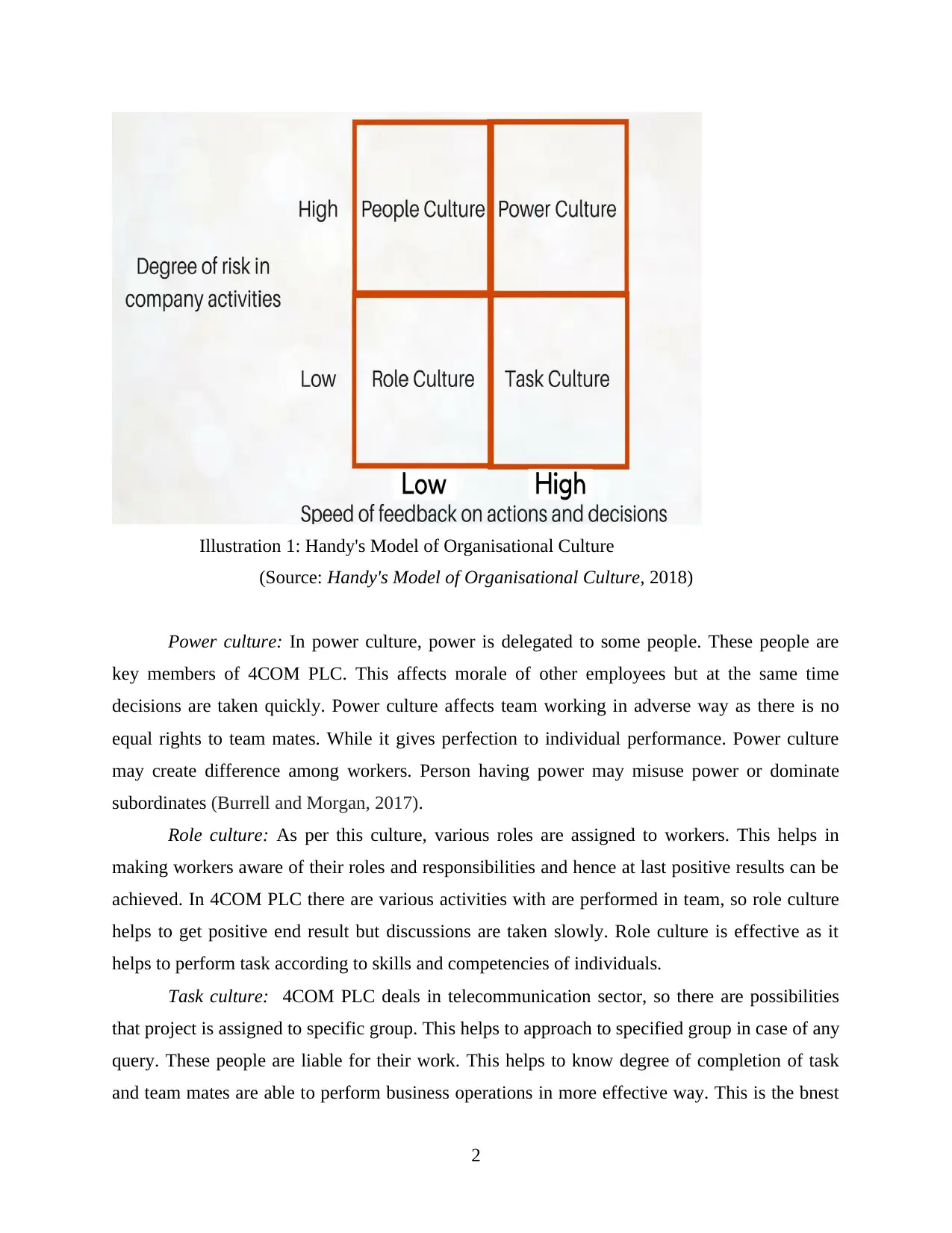
Illustration 1: Handy's Model of Organisational Culture
(Source: Handy's Model of Organisational Culture, 2018)
Power culture: In power culture, power is delegated to some people. These people are
key members of 4COM PLC. This affects morale of other employees but at the same time
decisions are taken quickly. Power culture affects team working in adverse way as there is no
equal rights to team mates. While it gives perfection to individual performance. Power culture
may create difference among workers. Person having power may misuse power or dominate
subordinates (Burrell and Morgan, 2017).
Role culture: As per this culture, various roles are assigned to workers. This helps in
making workers aware of their roles and responsibilities and hence at last positive results can be
achieved. In 4COM PLC there are various activities with are performed in team, so role culture
helps to get positive end result but discussions are taken slowly. Role culture is effective as it
helps to perform task according to skills and competencies of individuals.
Task culture: 4COM PLC deals in telecommunication sector, so there are possibilities
that project is assigned to specific group. This helps to approach to specified group in case of any
query. These people are liable for their work. This helps to know degree of completion of task
and team mates are able to perform business operations in more effective way. This is the bnest
2
(Source: Handy's Model of Organisational Culture, 2018)
Power culture: In power culture, power is delegated to some people. These people are
key members of 4COM PLC. This affects morale of other employees but at the same time
decisions are taken quickly. Power culture affects team working in adverse way as there is no
equal rights to team mates. While it gives perfection to individual performance. Power culture
may create difference among workers. Person having power may misuse power or dominate
subordinates (Burrell and Morgan, 2017).
Role culture: As per this culture, various roles are assigned to workers. This helps in
making workers aware of their roles and responsibilities and hence at last positive results can be
achieved. In 4COM PLC there are various activities with are performed in team, so role culture
helps to get positive end result but discussions are taken slowly. Role culture is effective as it
helps to perform task according to skills and competencies of individuals.
Task culture: 4COM PLC deals in telecommunication sector, so there are possibilities
that project is assigned to specific group. This helps to approach to specified group in case of any
query. These people are liable for their work. This helps to know degree of completion of task
and team mates are able to perform business operations in more effective way. This is the bnest
2
Secure Best Marks with AI Grader
Need help grading? Try our AI Grader for instant feedback on your assignments.
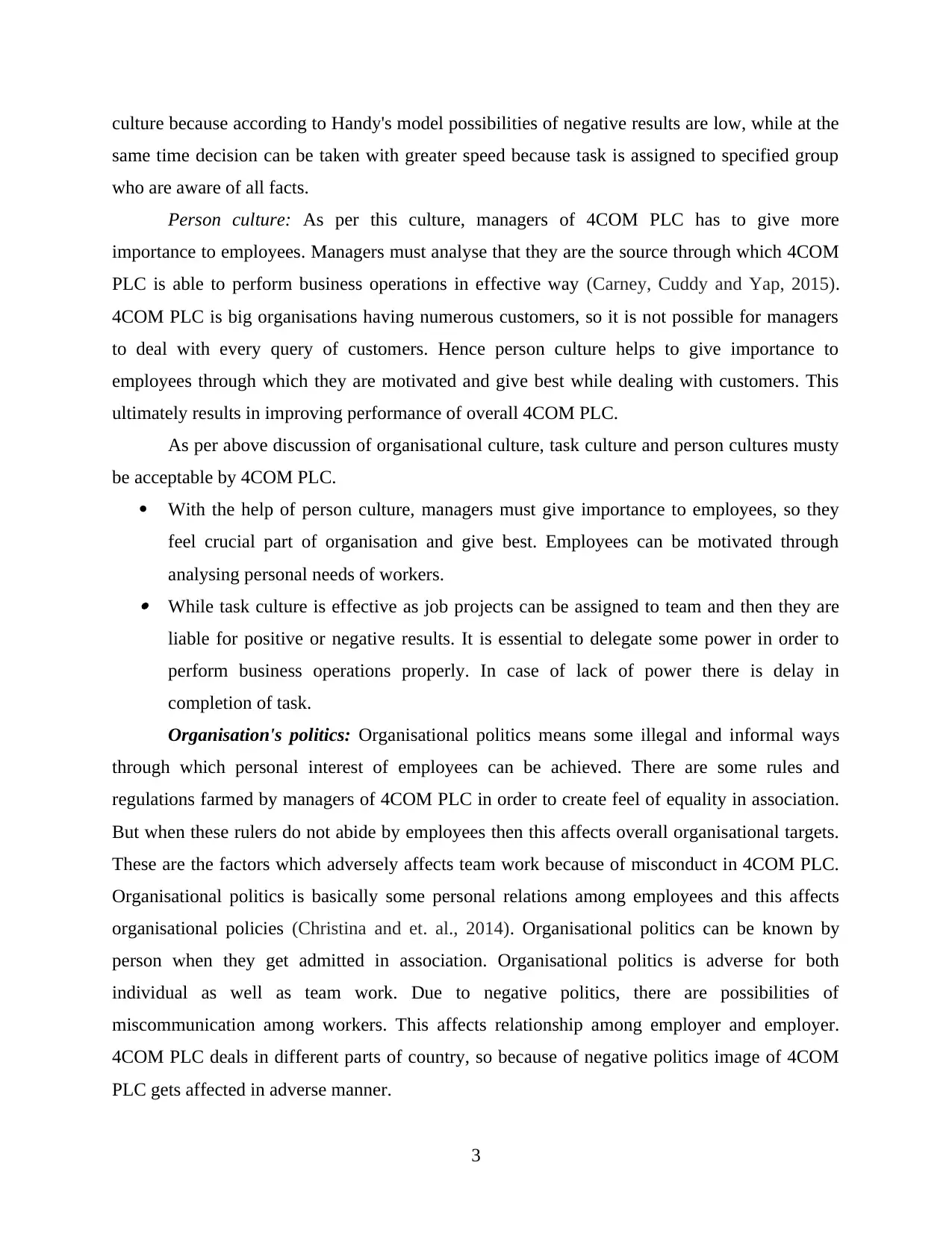
culture because according to Handy's model possibilities of negative results are low, while at the
same time decision can be taken with greater speed because task is assigned to specified group
who are aware of all facts.
Person culture: As per this culture, managers of 4COM PLC has to give more
importance to employees. Managers must analyse that they are the source through which 4COM
PLC is able to perform business operations in effective way (Carney, Cuddy and Yap, 2015).
4COM PLC is big organisations having numerous customers, so it is not possible for managers
to deal with every query of customers. Hence person culture helps to give importance to
employees through which they are motivated and give best while dealing with customers. This
ultimately results in improving performance of overall 4COM PLC.
As per above discussion of organisational culture, task culture and person cultures musty
be acceptable by 4COM PLC.
With the help of person culture, managers must give importance to employees, so they
feel crucial part of organisation and give best. Employees can be motivated through
analysing personal needs of workers. While task culture is effective as job projects can be assigned to team and then they are
liable for positive or negative results. It is essential to delegate some power in order to
perform business operations properly. In case of lack of power there is delay in
completion of task.
Organisation's politics: Organisational politics means some illegal and informal ways
through which personal interest of employees can be achieved. There are some rules and
regulations farmed by managers of 4COM PLC in order to create feel of equality in association.
But when these rulers do not abide by employees then this affects overall organisational targets.
These are the factors which adversely affects team work because of misconduct in 4COM PLC.
Organisational politics is basically some personal relations among employees and this affects
organisational policies (Christina and et. al., 2014). Organisational politics can be known by
person when they get admitted in association. Organisational politics is adverse for both
individual as well as team work. Due to negative politics, there are possibilities of
miscommunication among workers. This affects relationship among employer and employer.
4COM PLC deals in different parts of country, so because of negative politics image of 4COM
PLC gets affected in adverse manner.
3
same time decision can be taken with greater speed because task is assigned to specified group
who are aware of all facts.
Person culture: As per this culture, managers of 4COM PLC has to give more
importance to employees. Managers must analyse that they are the source through which 4COM
PLC is able to perform business operations in effective way (Carney, Cuddy and Yap, 2015).
4COM PLC is big organisations having numerous customers, so it is not possible for managers
to deal with every query of customers. Hence person culture helps to give importance to
employees through which they are motivated and give best while dealing with customers. This
ultimately results in improving performance of overall 4COM PLC.
As per above discussion of organisational culture, task culture and person cultures musty
be acceptable by 4COM PLC.
With the help of person culture, managers must give importance to employees, so they
feel crucial part of organisation and give best. Employees can be motivated through
analysing personal needs of workers. While task culture is effective as job projects can be assigned to team and then they are
liable for positive or negative results. It is essential to delegate some power in order to
perform business operations properly. In case of lack of power there is delay in
completion of task.
Organisation's politics: Organisational politics means some illegal and informal ways
through which personal interest of employees can be achieved. There are some rules and
regulations farmed by managers of 4COM PLC in order to create feel of equality in association.
But when these rulers do not abide by employees then this affects overall organisational targets.
These are the factors which adversely affects team work because of misconduct in 4COM PLC.
Organisational politics is basically some personal relations among employees and this affects
organisational policies (Christina and et. al., 2014). Organisational politics can be known by
person when they get admitted in association. Organisational politics is adverse for both
individual as well as team work. Due to negative politics, there are possibilities of
miscommunication among workers. This affects relationship among employer and employer.
4COM PLC deals in different parts of country, so because of negative politics image of 4COM
PLC gets affected in adverse manner.
3
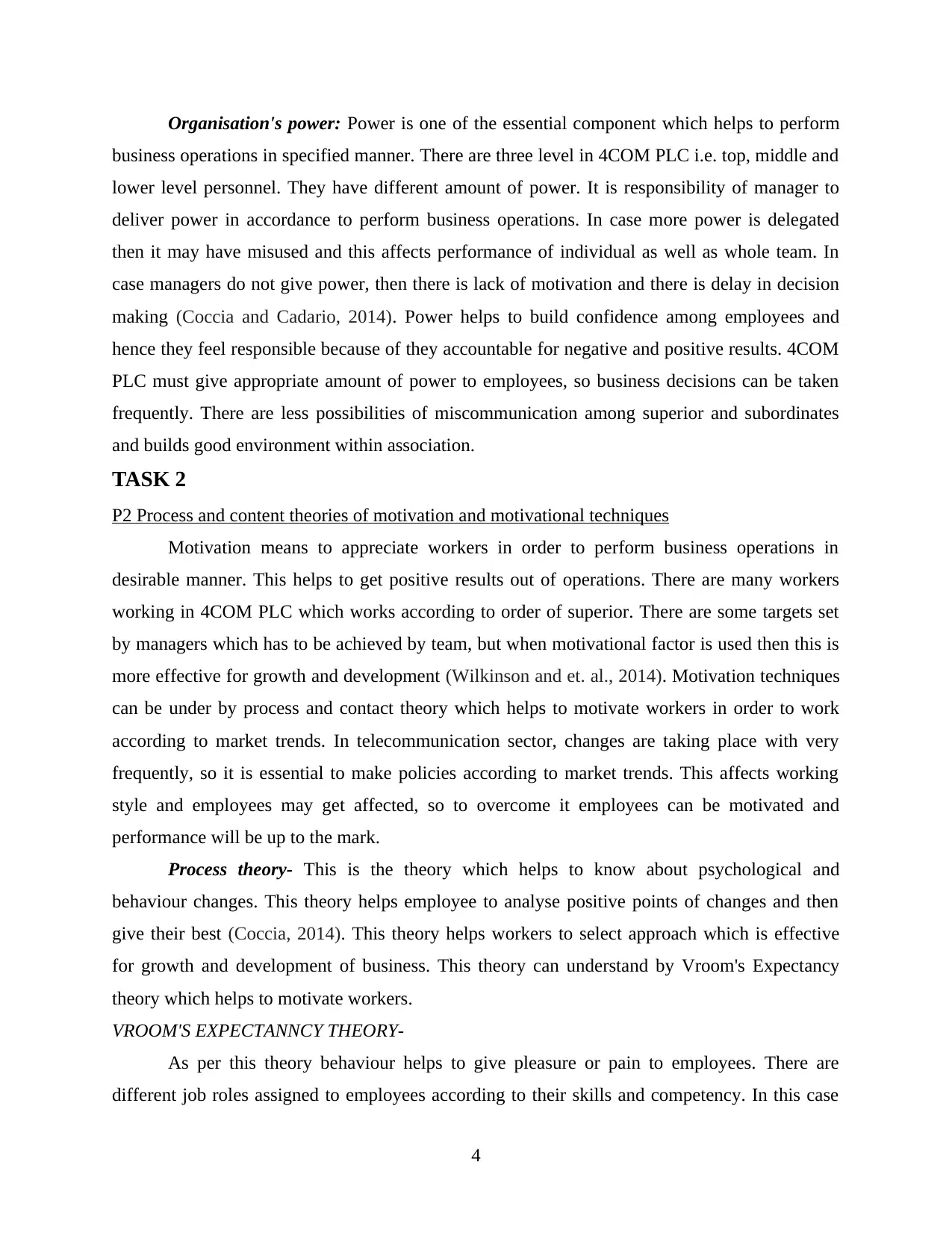
Organisation's power: Power is one of the essential component which helps to perform
business operations in specified manner. There are three level in 4COM PLC i.e. top, middle and
lower level personnel. They have different amount of power. It is responsibility of manager to
deliver power in accordance to perform business operations. In case more power is delegated
then it may have misused and this affects performance of individual as well as whole team. In
case managers do not give power, then there is lack of motivation and there is delay in decision
making (Coccia and Cadario, 2014). Power helps to build confidence among employees and
hence they feel responsible because of they accountable for negative and positive results. 4COM
PLC must give appropriate amount of power to employees, so business decisions can be taken
frequently. There are less possibilities of miscommunication among superior and subordinates
and builds good environment within association.
TASK 2
P2 Process and content theories of motivation and motivational techniques
Motivation means to appreciate workers in order to perform business operations in
desirable manner. This helps to get positive results out of operations. There are many workers
working in 4COM PLC which works according to order of superior. There are some targets set
by managers which has to be achieved by team, but when motivational factor is used then this is
more effective for growth and development (Wilkinson and et. al., 2014). Motivation techniques
can be under by process and contact theory which helps to motivate workers in order to work
according to market trends. In telecommunication sector, changes are taking place with very
frequently, so it is essential to make policies according to market trends. This affects working
style and employees may get affected, so to overcome it employees can be motivated and
performance will be up to the mark.
Process theory- This is the theory which helps to know about psychological and
behaviour changes. This theory helps employee to analyse positive points of changes and then
give their best (Coccia, 2014). This theory helps workers to select approach which is effective
for growth and development of business. This theory can understand by Vroom's Expectancy
theory which helps to motivate workers.
VROOM'S EXPECTANNCY THEORY-
As per this theory behaviour helps to give pleasure or pain to employees. There are
different job roles assigned to employees according to their skills and competency. In this case
4
business operations in specified manner. There are three level in 4COM PLC i.e. top, middle and
lower level personnel. They have different amount of power. It is responsibility of manager to
deliver power in accordance to perform business operations. In case more power is delegated
then it may have misused and this affects performance of individual as well as whole team. In
case managers do not give power, then there is lack of motivation and there is delay in decision
making (Coccia and Cadario, 2014). Power helps to build confidence among employees and
hence they feel responsible because of they accountable for negative and positive results. 4COM
PLC must give appropriate amount of power to employees, so business decisions can be taken
frequently. There are less possibilities of miscommunication among superior and subordinates
and builds good environment within association.
TASK 2
P2 Process and content theories of motivation and motivational techniques
Motivation means to appreciate workers in order to perform business operations in
desirable manner. This helps to get positive results out of operations. There are many workers
working in 4COM PLC which works according to order of superior. There are some targets set
by managers which has to be achieved by team, but when motivational factor is used then this is
more effective for growth and development (Wilkinson and et. al., 2014). Motivation techniques
can be under by process and contact theory which helps to motivate workers in order to work
according to market trends. In telecommunication sector, changes are taking place with very
frequently, so it is essential to make policies according to market trends. This affects working
style and employees may get affected, so to overcome it employees can be motivated and
performance will be up to the mark.
Process theory- This is the theory which helps to know about psychological and
behaviour changes. This theory helps employee to analyse positive points of changes and then
give their best (Coccia, 2014). This theory helps workers to select approach which is effective
for growth and development of business. This theory can understand by Vroom's Expectancy
theory which helps to motivate workers.
VROOM'S EXPECTANNCY THEORY-
As per this theory behaviour helps to give pleasure or pain to employees. There are
different job roles assigned to employees according to their skills and competency. In this case
4
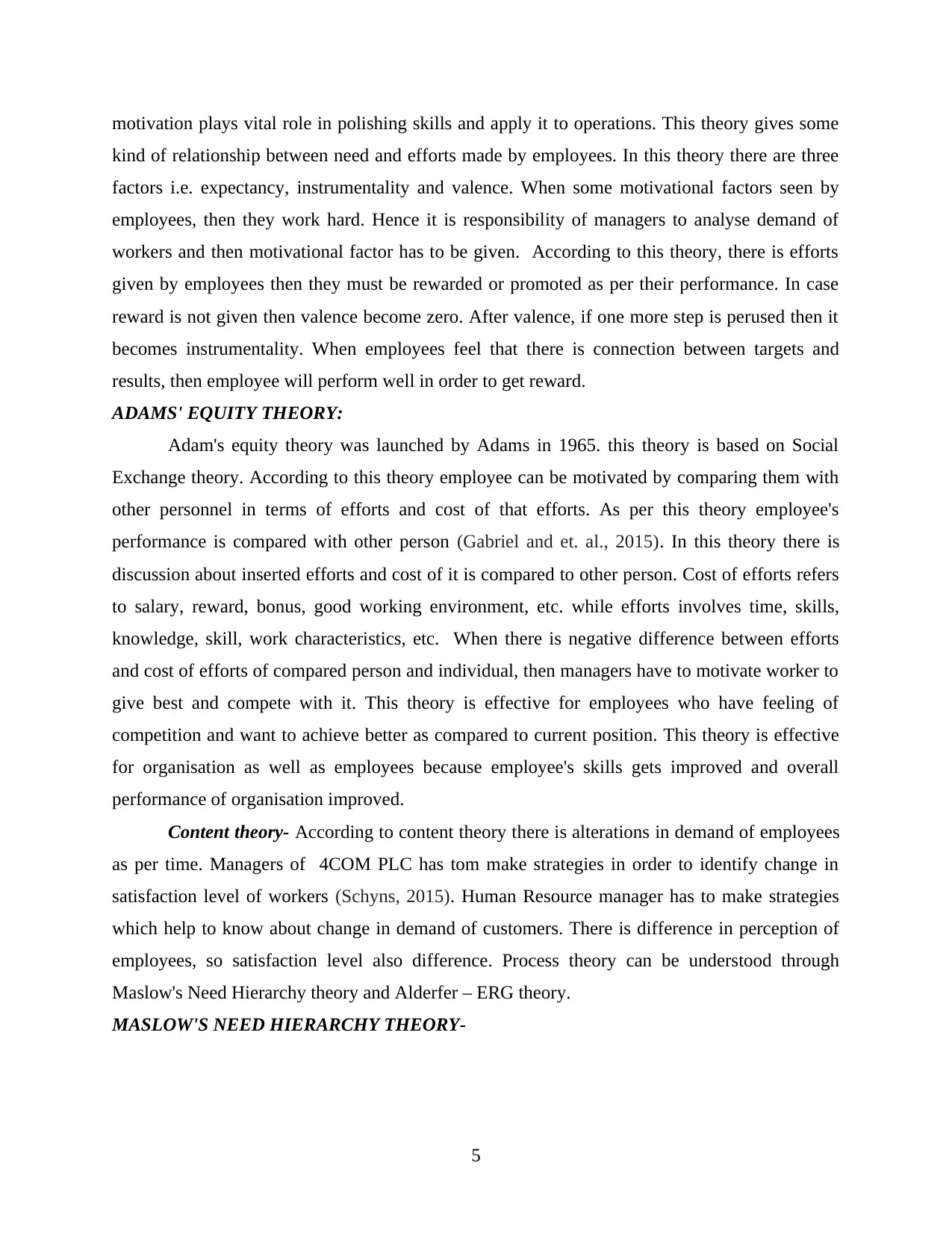
motivation plays vital role in polishing skills and apply it to operations. This theory gives some
kind of relationship between need and efforts made by employees. In this theory there are three
factors i.e. expectancy, instrumentality and valence. When some motivational factors seen by
employees, then they work hard. Hence it is responsibility of managers to analyse demand of
workers and then motivational factor has to be given. According to this theory, there is efforts
given by employees then they must be rewarded or promoted as per their performance. In case
reward is not given then valence become zero. After valence, if one more step is perused then it
becomes instrumentality. When employees feel that there is connection between targets and
results, then employee will perform well in order to get reward.
ADAMS' EQUITY THEORY:
Adam's equity theory was launched by Adams in 1965. this theory is based on Social
Exchange theory. According to this theory employee can be motivated by comparing them with
other personnel in terms of efforts and cost of that efforts. As per this theory employee's
performance is compared with other person (Gabriel and et. al., 2015). In this theory there is
discussion about inserted efforts and cost of it is compared to other person. Cost of efforts refers
to salary, reward, bonus, good working environment, etc. while efforts involves time, skills,
knowledge, skill, work characteristics, etc. When there is negative difference between efforts
and cost of efforts of compared person and individual, then managers have to motivate worker to
give best and compete with it. This theory is effective for employees who have feeling of
competition and want to achieve better as compared to current position. This theory is effective
for organisation as well as employees because employee's skills gets improved and overall
performance of organisation improved.
Content theory- According to content theory there is alterations in demand of employees
as per time. Managers of 4COM PLC has tom make strategies in order to identify change in
satisfaction level of workers (Schyns, 2015). Human Resource manager has to make strategies
which help to know about change in demand of customers. There is difference in perception of
employees, so satisfaction level also difference. Process theory can be understood through
Maslow's Need Hierarchy theory and Alderfer – ERG theory.
MASLOW'S NEED HIERARCHY THEORY-
5
kind of relationship between need and efforts made by employees. In this theory there are three
factors i.e. expectancy, instrumentality and valence. When some motivational factors seen by
employees, then they work hard. Hence it is responsibility of managers to analyse demand of
workers and then motivational factor has to be given. According to this theory, there is efforts
given by employees then they must be rewarded or promoted as per their performance. In case
reward is not given then valence become zero. After valence, if one more step is perused then it
becomes instrumentality. When employees feel that there is connection between targets and
results, then employee will perform well in order to get reward.
ADAMS' EQUITY THEORY:
Adam's equity theory was launched by Adams in 1965. this theory is based on Social
Exchange theory. According to this theory employee can be motivated by comparing them with
other personnel in terms of efforts and cost of that efforts. As per this theory employee's
performance is compared with other person (Gabriel and et. al., 2015). In this theory there is
discussion about inserted efforts and cost of it is compared to other person. Cost of efforts refers
to salary, reward, bonus, good working environment, etc. while efforts involves time, skills,
knowledge, skill, work characteristics, etc. When there is negative difference between efforts
and cost of efforts of compared person and individual, then managers have to motivate worker to
give best and compete with it. This theory is effective for employees who have feeling of
competition and want to achieve better as compared to current position. This theory is effective
for organisation as well as employees because employee's skills gets improved and overall
performance of organisation improved.
Content theory- According to content theory there is alterations in demand of employees
as per time. Managers of 4COM PLC has tom make strategies in order to identify change in
satisfaction level of workers (Schyns, 2015). Human Resource manager has to make strategies
which help to know about change in demand of customers. There is difference in perception of
employees, so satisfaction level also difference. Process theory can be understood through
Maslow's Need Hierarchy theory and Alderfer – ERG theory.
MASLOW'S NEED HIERARCHY THEORY-
5
Paraphrase This Document
Need a fresh take? Get an instant paraphrase of this document with our AI Paraphraser
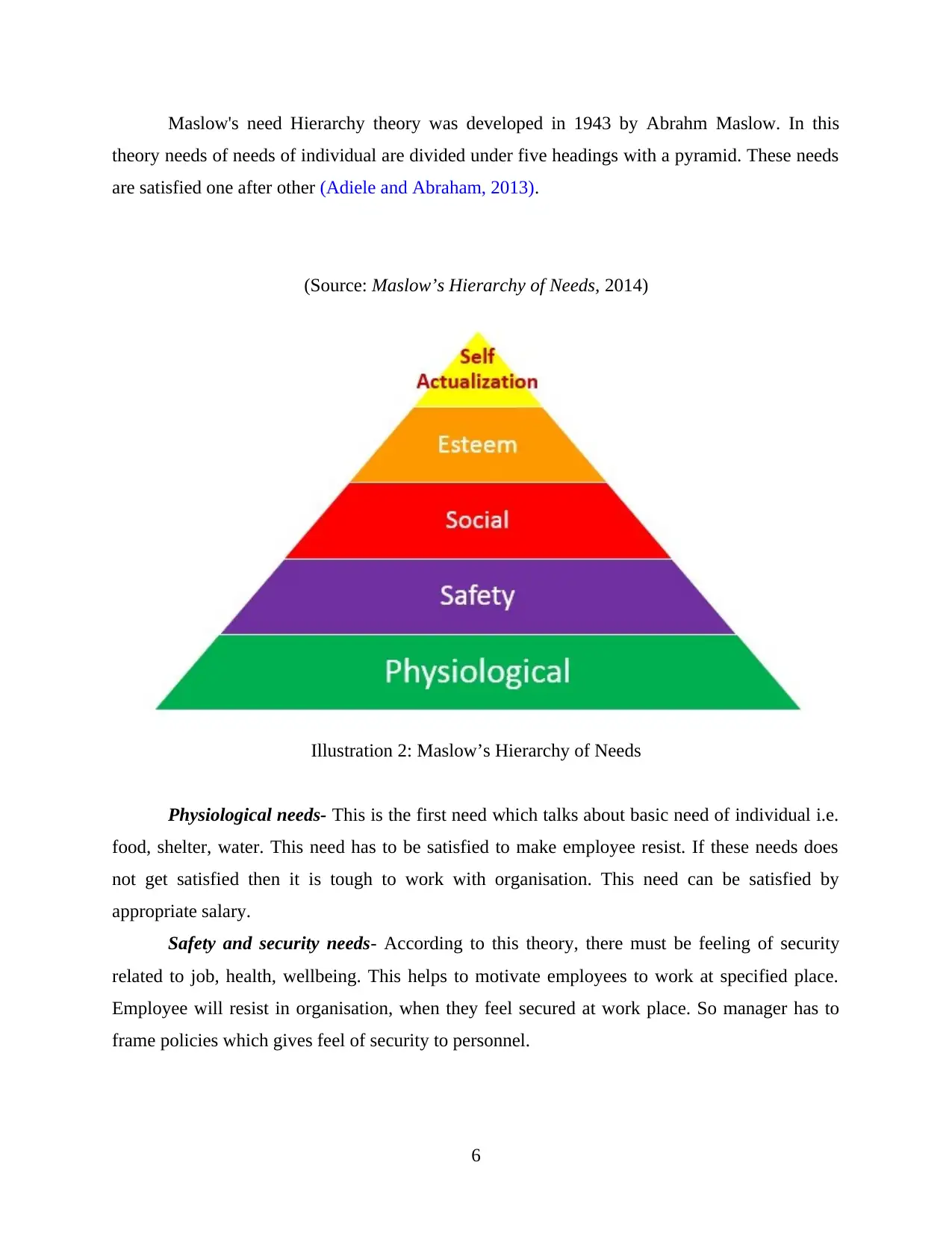
Maslow's need Hierarchy theory was developed in 1943 by Abrahm Maslow. In this
theory needs of needs of individual are divided under five headings with a pyramid. These needs
are satisfied one after other (Adiele and Abraham, 2013).
(Source: Maslow’s Hierarchy of Needs, 2014)
Physiological needs- This is the first need which talks about basic need of individual i.e.
food, shelter, water. This need has to be satisfied to make employee resist. If these needs does
not get satisfied then it is tough to work with organisation. This need can be satisfied by
appropriate salary.
Safety and security needs- According to this theory, there must be feeling of security
related to job, health, wellbeing. This helps to motivate employees to work at specified place.
Employee will resist in organisation, when they feel secured at work place. So manager has to
frame policies which gives feel of security to personnel.
6
Illustration 2: Maslow’s Hierarchy of Needs
theory needs of needs of individual are divided under five headings with a pyramid. These needs
are satisfied one after other (Adiele and Abraham, 2013).
(Source: Maslow’s Hierarchy of Needs, 2014)
Physiological needs- This is the first need which talks about basic need of individual i.e.
food, shelter, water. This need has to be satisfied to make employee resist. If these needs does
not get satisfied then it is tough to work with organisation. This need can be satisfied by
appropriate salary.
Safety and security needs- According to this theory, there must be feeling of security
related to job, health, wellbeing. This helps to motivate employees to work at specified place.
Employee will resist in organisation, when they feel secured at work place. So manager has to
frame policies which gives feel of security to personnel.
6
Illustration 2: Maslow’s Hierarchy of Needs
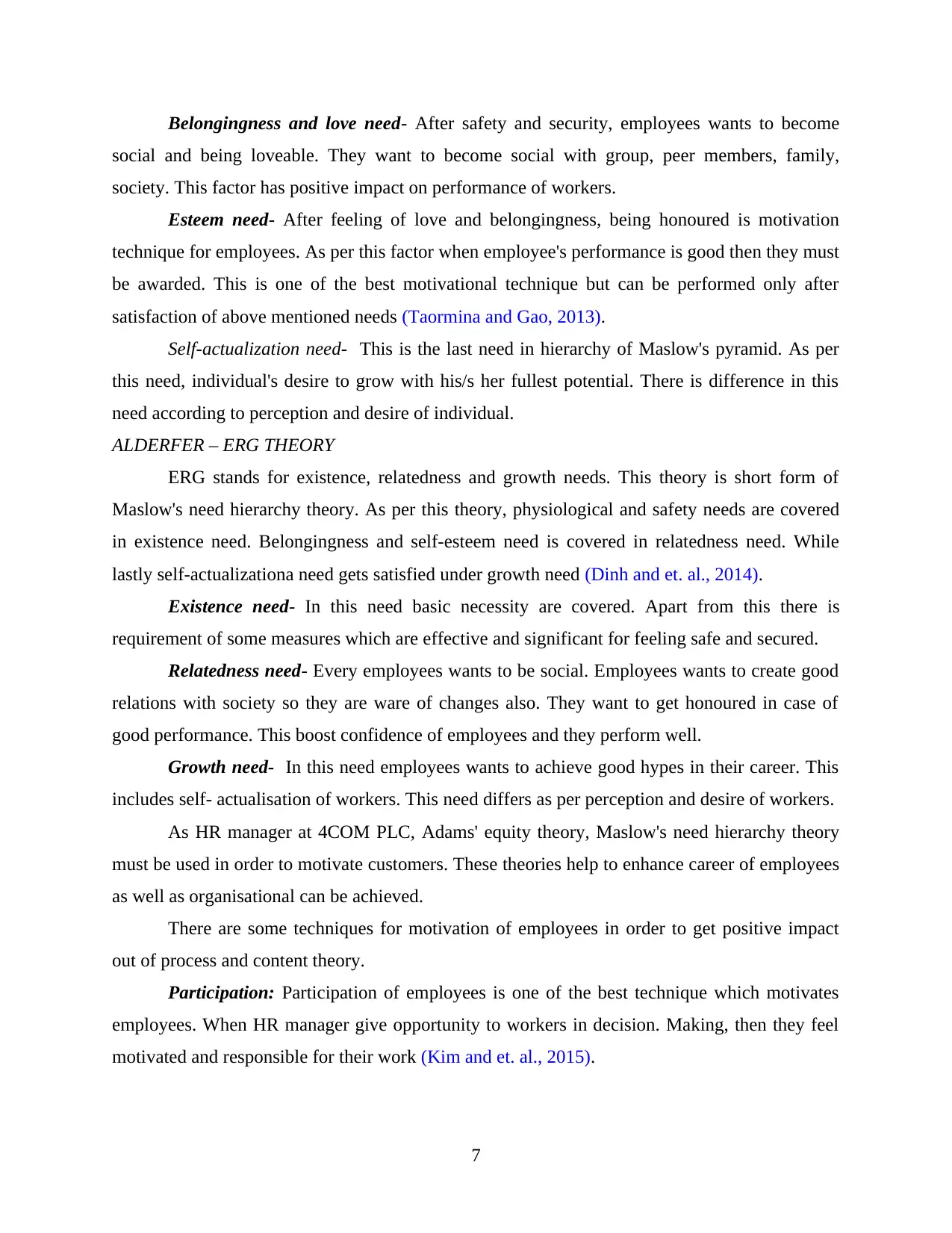
Belongingness and love need- After safety and security, employees wants to become
social and being loveable. They want to become social with group, peer members, family,
society. This factor has positive impact on performance of workers.
Esteem need- After feeling of love and belongingness, being honoured is motivation
technique for employees. As per this factor when employee's performance is good then they must
be awarded. This is one of the best motivational technique but can be performed only after
satisfaction of above mentioned needs (Taormina and Gao, 2013).
Self-actualization need- This is the last need in hierarchy of Maslow's pyramid. As per
this need, individual's desire to grow with his/s her fullest potential. There is difference in this
need according to perception and desire of individual.
ALDERFER – ERG THEORY
ERG stands for existence, relatedness and growth needs. This theory is short form of
Maslow's need hierarchy theory. As per this theory, physiological and safety needs are covered
in existence need. Belongingness and self-esteem need is covered in relatedness need. While
lastly self-actualizationa need gets satisfied under growth need (Dinh and et. al., 2014).
Existence need- In this need basic necessity are covered. Apart from this there is
requirement of some measures which are effective and significant for feeling safe and secured.
Relatedness need- Every employees wants to be social. Employees wants to create good
relations with society so they are ware of changes also. They want to get honoured in case of
good performance. This boost confidence of employees and they perform well.
Growth need- In this need employees wants to achieve good hypes in their career. This
includes self- actualisation of workers. This need differs as per perception and desire of workers.
As HR manager at 4COM PLC, Adams' equity theory, Maslow's need hierarchy theory
must be used in order to motivate customers. These theories help to enhance career of employees
as well as organisational can be achieved.
There are some techniques for motivation of employees in order to get positive impact
out of process and content theory.
Participation: Participation of employees is one of the best technique which motivates
employees. When HR manager give opportunity to workers in decision. Making, then they feel
motivated and responsible for their work (Kim and et. al., 2015).
7
social and being loveable. They want to become social with group, peer members, family,
society. This factor has positive impact on performance of workers.
Esteem need- After feeling of love and belongingness, being honoured is motivation
technique for employees. As per this factor when employee's performance is good then they must
be awarded. This is one of the best motivational technique but can be performed only after
satisfaction of above mentioned needs (Taormina and Gao, 2013).
Self-actualization need- This is the last need in hierarchy of Maslow's pyramid. As per
this need, individual's desire to grow with his/s her fullest potential. There is difference in this
need according to perception and desire of individual.
ALDERFER – ERG THEORY
ERG stands for existence, relatedness and growth needs. This theory is short form of
Maslow's need hierarchy theory. As per this theory, physiological and safety needs are covered
in existence need. Belongingness and self-esteem need is covered in relatedness need. While
lastly self-actualizationa need gets satisfied under growth need (Dinh and et. al., 2014).
Existence need- In this need basic necessity are covered. Apart from this there is
requirement of some measures which are effective and significant for feeling safe and secured.
Relatedness need- Every employees wants to be social. Employees wants to create good
relations with society so they are ware of changes also. They want to get honoured in case of
good performance. This boost confidence of employees and they perform well.
Growth need- In this need employees wants to achieve good hypes in their career. This
includes self- actualisation of workers. This need differs as per perception and desire of workers.
As HR manager at 4COM PLC, Adams' equity theory, Maslow's need hierarchy theory
must be used in order to motivate customers. These theories help to enhance career of employees
as well as organisational can be achieved.
There are some techniques for motivation of employees in order to get positive impact
out of process and content theory.
Participation: Participation of employees is one of the best technique which motivates
employees. When HR manager give opportunity to workers in decision. Making, then they feel
motivated and responsible for their work (Kim and et. al., 2015).
7
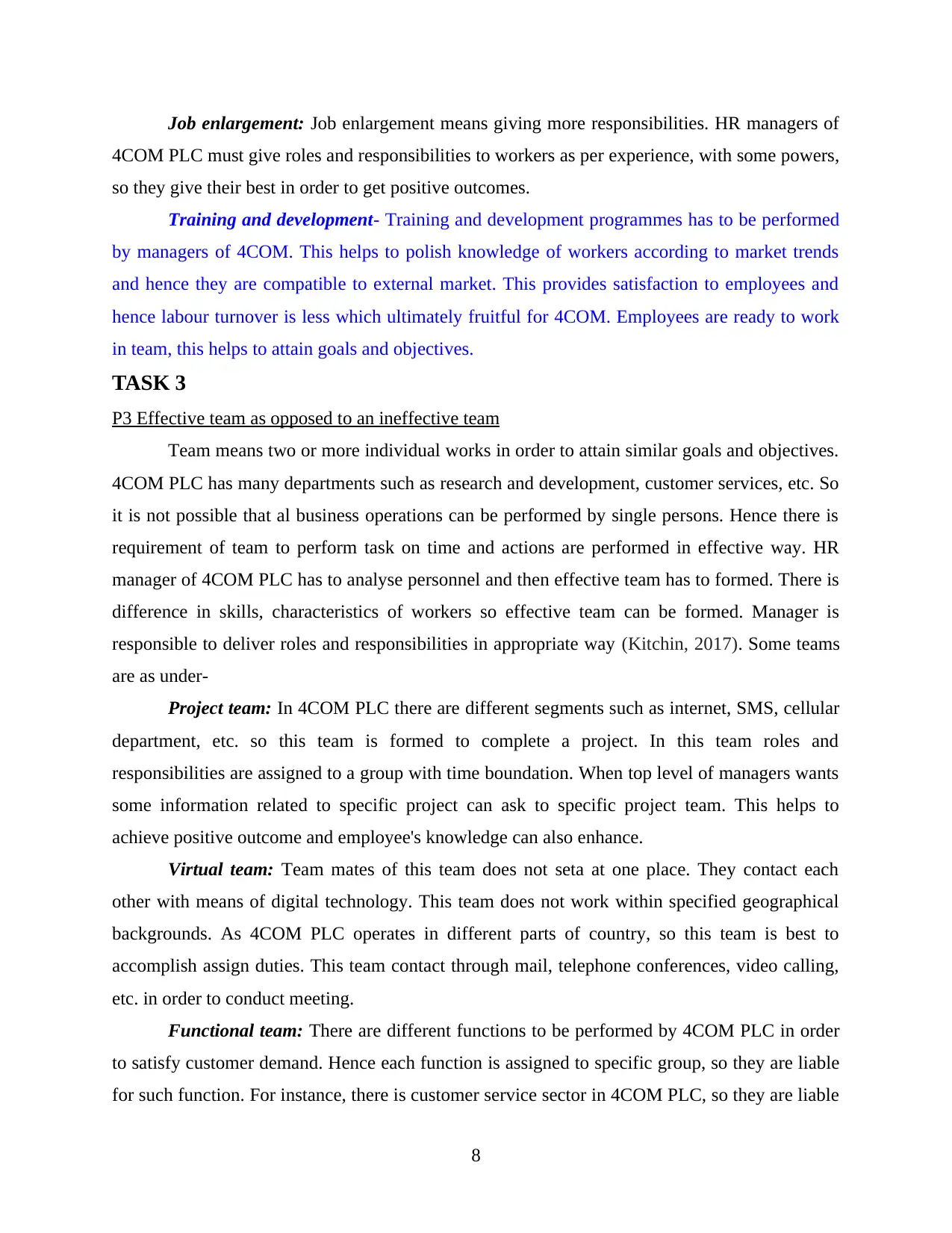
Job enlargement: Job enlargement means giving more responsibilities. HR managers of
4COM PLC must give roles and responsibilities to workers as per experience, with some powers,
so they give their best in order to get positive outcomes.
Training and development- Training and development programmes has to be performed
by managers of 4COM. This helps to polish knowledge of workers according to market trends
and hence they are compatible to external market. This provides satisfaction to employees and
hence labour turnover is less which ultimately fruitful for 4COM. Employees are ready to work
in team, this helps to attain goals and objectives.
TASK 3
P3 Effective team as opposed to an ineffective team
Team means two or more individual works in order to attain similar goals and objectives.
4COM PLC has many departments such as research and development, customer services, etc. So
it is not possible that al business operations can be performed by single persons. Hence there is
requirement of team to perform task on time and actions are performed in effective way. HR
manager of 4COM PLC has to analyse personnel and then effective team has to formed. There is
difference in skills, characteristics of workers so effective team can be formed. Manager is
responsible to deliver roles and responsibilities in appropriate way (Kitchin, 2017). Some teams
are as under-
Project team: In 4COM PLC there are different segments such as internet, SMS, cellular
department, etc. so this team is formed to complete a project. In this team roles and
responsibilities are assigned to a group with time boundation. When top level of managers wants
some information related to specific project can ask to specific project team. This helps to
achieve positive outcome and employee's knowledge can also enhance.
Virtual team: Team mates of this team does not seta at one place. They contact each
other with means of digital technology. This team does not work within specified geographical
backgrounds. As 4COM PLC operates in different parts of country, so this team is best to
accomplish assign duties. This team contact through mail, telephone conferences, video calling,
etc. in order to conduct meeting.
Functional team: There are different functions to be performed by 4COM PLC in order
to satisfy customer demand. Hence each function is assigned to specific group, so they are liable
for such function. For instance, there is customer service sector in 4COM PLC, so they are liable
8
4COM PLC must give roles and responsibilities to workers as per experience, with some powers,
so they give their best in order to get positive outcomes.
Training and development- Training and development programmes has to be performed
by managers of 4COM. This helps to polish knowledge of workers according to market trends
and hence they are compatible to external market. This provides satisfaction to employees and
hence labour turnover is less which ultimately fruitful for 4COM. Employees are ready to work
in team, this helps to attain goals and objectives.
TASK 3
P3 Effective team as opposed to an ineffective team
Team means two or more individual works in order to attain similar goals and objectives.
4COM PLC has many departments such as research and development, customer services, etc. So
it is not possible that al business operations can be performed by single persons. Hence there is
requirement of team to perform task on time and actions are performed in effective way. HR
manager of 4COM PLC has to analyse personnel and then effective team has to formed. There is
difference in skills, characteristics of workers so effective team can be formed. Manager is
responsible to deliver roles and responsibilities in appropriate way (Kitchin, 2017). Some teams
are as under-
Project team: In 4COM PLC there are different segments such as internet, SMS, cellular
department, etc. so this team is formed to complete a project. In this team roles and
responsibilities are assigned to a group with time boundation. When top level of managers wants
some information related to specific project can ask to specific project team. This helps to
achieve positive outcome and employee's knowledge can also enhance.
Virtual team: Team mates of this team does not seta at one place. They contact each
other with means of digital technology. This team does not work within specified geographical
backgrounds. As 4COM PLC operates in different parts of country, so this team is best to
accomplish assign duties. This team contact through mail, telephone conferences, video calling,
etc. in order to conduct meeting.
Functional team: There are different functions to be performed by 4COM PLC in order
to satisfy customer demand. Hence each function is assigned to specific group, so they are liable
for such function. For instance, there is customer service sector in 4COM PLC, so they are liable
8
Secure Best Marks with AI Grader
Need help grading? Try our AI Grader for instant feedback on your assignments.
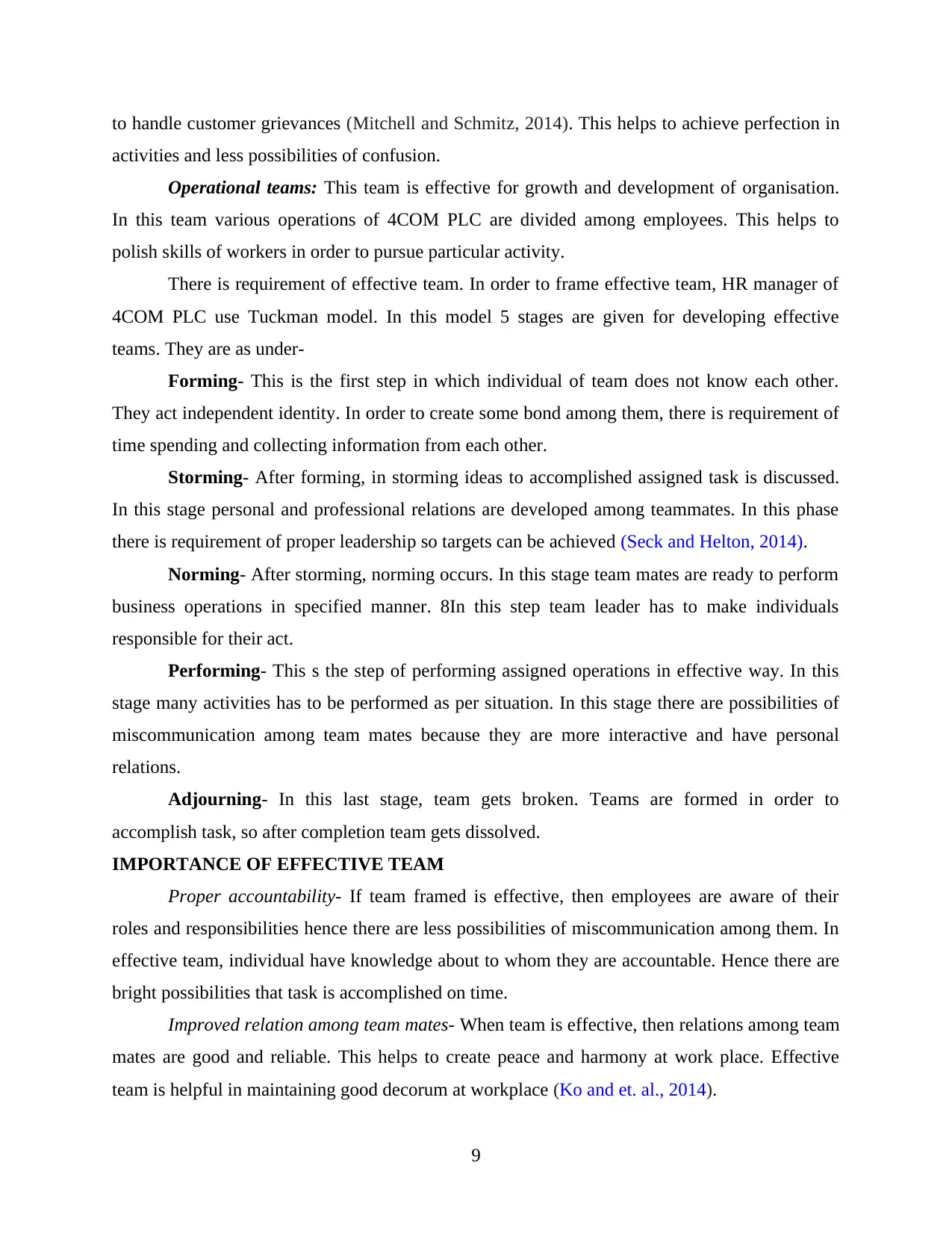
to handle customer grievances (Mitchell and Schmitz, 2014). This helps to achieve perfection in
activities and less possibilities of confusion.
Operational teams: This team is effective for growth and development of organisation.
In this team various operations of 4COM PLC are divided among employees. This helps to
polish skills of workers in order to pursue particular activity.
There is requirement of effective team. In order to frame effective team, HR manager of
4COM PLC use Tuckman model. In this model 5 stages are given for developing effective
teams. They are as under-
Forming- This is the first step in which individual of team does not know each other.
They act independent identity. In order to create some bond among them, there is requirement of
time spending and collecting information from each other.
Storming- After forming, in storming ideas to accomplished assigned task is discussed.
In this stage personal and professional relations are developed among teammates. In this phase
there is requirement of proper leadership so targets can be achieved (Seck and Helton, 2014).
Norming- After storming, norming occurs. In this stage team mates are ready to perform
business operations in specified manner. 8In this step team leader has to make individuals
responsible for their act.
Performing- This s the step of performing assigned operations in effective way. In this
stage many activities has to be performed as per situation. In this stage there are possibilities of
miscommunication among team mates because they are more interactive and have personal
relations.
Adjourning- In this last stage, team gets broken. Teams are formed in order to
accomplish task, so after completion team gets dissolved.
IMPORTANCE OF EFFECTIVE TEAM
Proper accountability- If team framed is effective, then employees are aware of their
roles and responsibilities hence there are less possibilities of miscommunication among them. In
effective team, individual have knowledge about to whom they are accountable. Hence there are
bright possibilities that task is accomplished on time.
Improved relation among team mates- When team is effective, then relations among team
mates are good and reliable. This helps to create peace and harmony at work place. Effective
team is helpful in maintaining good decorum at workplace (Ko and et. al., 2014).
9
activities and less possibilities of confusion.
Operational teams: This team is effective for growth and development of organisation.
In this team various operations of 4COM PLC are divided among employees. This helps to
polish skills of workers in order to pursue particular activity.
There is requirement of effective team. In order to frame effective team, HR manager of
4COM PLC use Tuckman model. In this model 5 stages are given for developing effective
teams. They are as under-
Forming- This is the first step in which individual of team does not know each other.
They act independent identity. In order to create some bond among them, there is requirement of
time spending and collecting information from each other.
Storming- After forming, in storming ideas to accomplished assigned task is discussed.
In this stage personal and professional relations are developed among teammates. In this phase
there is requirement of proper leadership so targets can be achieved (Seck and Helton, 2014).
Norming- After storming, norming occurs. In this stage team mates are ready to perform
business operations in specified manner. 8In this step team leader has to make individuals
responsible for their act.
Performing- This s the step of performing assigned operations in effective way. In this
stage many activities has to be performed as per situation. In this stage there are possibilities of
miscommunication among team mates because they are more interactive and have personal
relations.
Adjourning- In this last stage, team gets broken. Teams are formed in order to
accomplish task, so after completion team gets dissolved.
IMPORTANCE OF EFFECTIVE TEAM
Proper accountability- If team framed is effective, then employees are aware of their
roles and responsibilities hence there are less possibilities of miscommunication among them. In
effective team, individual have knowledge about to whom they are accountable. Hence there are
bright possibilities that task is accomplished on time.
Improved relation among team mates- When team is effective, then relations among team
mates are good and reliable. This helps to create peace and harmony at work place. Effective
team is helpful in maintaining good decorum at workplace (Ko and et. al., 2014).
9
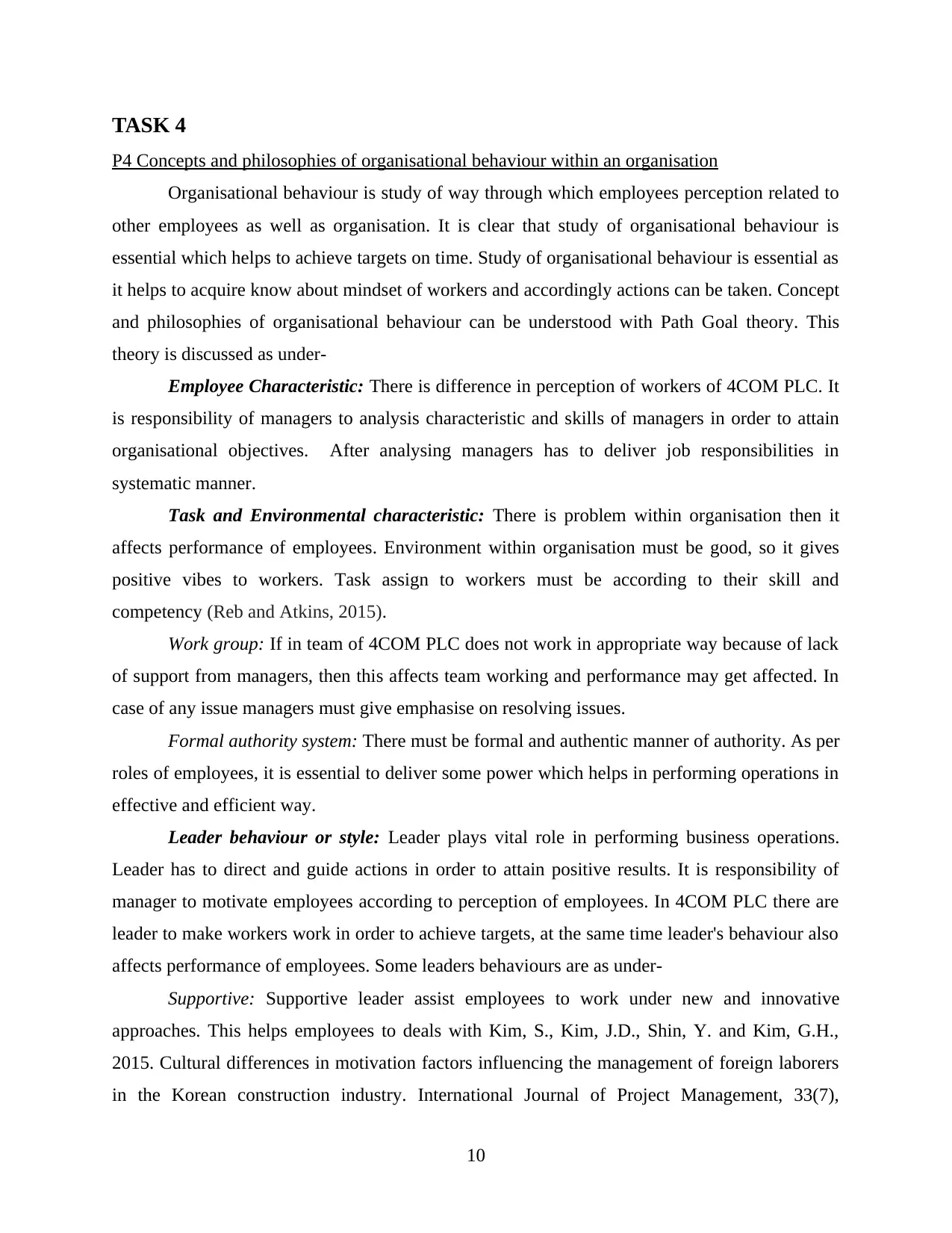
TASK 4
P4 Concepts and philosophies of organisational behaviour within an organisation
Organisational behaviour is study of way through which employees perception related to
other employees as well as organisation. It is clear that study of organisational behaviour is
essential which helps to achieve targets on time. Study of organisational behaviour is essential as
it helps to acquire know about mindset of workers and accordingly actions can be taken. Concept
and philosophies of organisational behaviour can be understood with Path Goal theory. This
theory is discussed as under-
Employee Characteristic: There is difference in perception of workers of 4COM PLC. It
is responsibility of managers to analysis characteristic and skills of managers in order to attain
organisational objectives. After analysing managers has to deliver job responsibilities in
systematic manner.
Task and Environmental characteristic: There is problem within organisation then it
affects performance of employees. Environment within organisation must be good, so it gives
positive vibes to workers. Task assign to workers must be according to their skill and
competency (Reb and Atkins, 2015).
Work group: If in team of 4COM PLC does not work in appropriate way because of lack
of support from managers, then this affects team working and performance may get affected. In
case of any issue managers must give emphasise on resolving issues.
Formal authority system: There must be formal and authentic manner of authority. As per
roles of employees, it is essential to deliver some power which helps in performing operations in
effective and efficient way.
Leader behaviour or style: Leader plays vital role in performing business operations.
Leader has to direct and guide actions in order to attain positive results. It is responsibility of
manager to motivate employees according to perception of employees. In 4COM PLC there are
leader to make workers work in order to achieve targets, at the same time leader's behaviour also
affects performance of employees. Some leaders behaviours are as under-
Supportive: Supportive leader assist employees to work under new and innovative
approaches. This helps employees to deals with Kim, S., Kim, J.D., Shin, Y. and Kim, G.H.,
2015. Cultural differences in motivation factors influencing the management of foreign laborers
in the Korean construction industry. International Journal of Project Management, 33(7),
10
P4 Concepts and philosophies of organisational behaviour within an organisation
Organisational behaviour is study of way through which employees perception related to
other employees as well as organisation. It is clear that study of organisational behaviour is
essential which helps to achieve targets on time. Study of organisational behaviour is essential as
it helps to acquire know about mindset of workers and accordingly actions can be taken. Concept
and philosophies of organisational behaviour can be understood with Path Goal theory. This
theory is discussed as under-
Employee Characteristic: There is difference in perception of workers of 4COM PLC. It
is responsibility of managers to analysis characteristic and skills of managers in order to attain
organisational objectives. After analysing managers has to deliver job responsibilities in
systematic manner.
Task and Environmental characteristic: There is problem within organisation then it
affects performance of employees. Environment within organisation must be good, so it gives
positive vibes to workers. Task assign to workers must be according to their skill and
competency (Reb and Atkins, 2015).
Work group: If in team of 4COM PLC does not work in appropriate way because of lack
of support from managers, then this affects team working and performance may get affected. In
case of any issue managers must give emphasise on resolving issues.
Formal authority system: There must be formal and authentic manner of authority. As per
roles of employees, it is essential to deliver some power which helps in performing operations in
effective and efficient way.
Leader behaviour or style: Leader plays vital role in performing business operations.
Leader has to direct and guide actions in order to attain positive results. It is responsibility of
manager to motivate employees according to perception of employees. In 4COM PLC there are
leader to make workers work in order to achieve targets, at the same time leader's behaviour also
affects performance of employees. Some leaders behaviours are as under-
Supportive: Supportive leader assist employees to work under new and innovative
approaches. This helps employees to deals with Kim, S., Kim, J.D., Shin, Y. and Kim, G.H.,
2015. Cultural differences in motivation factors influencing the management of foreign laborers
in the Korean construction industry. International Journal of Project Management, 33(7),
10
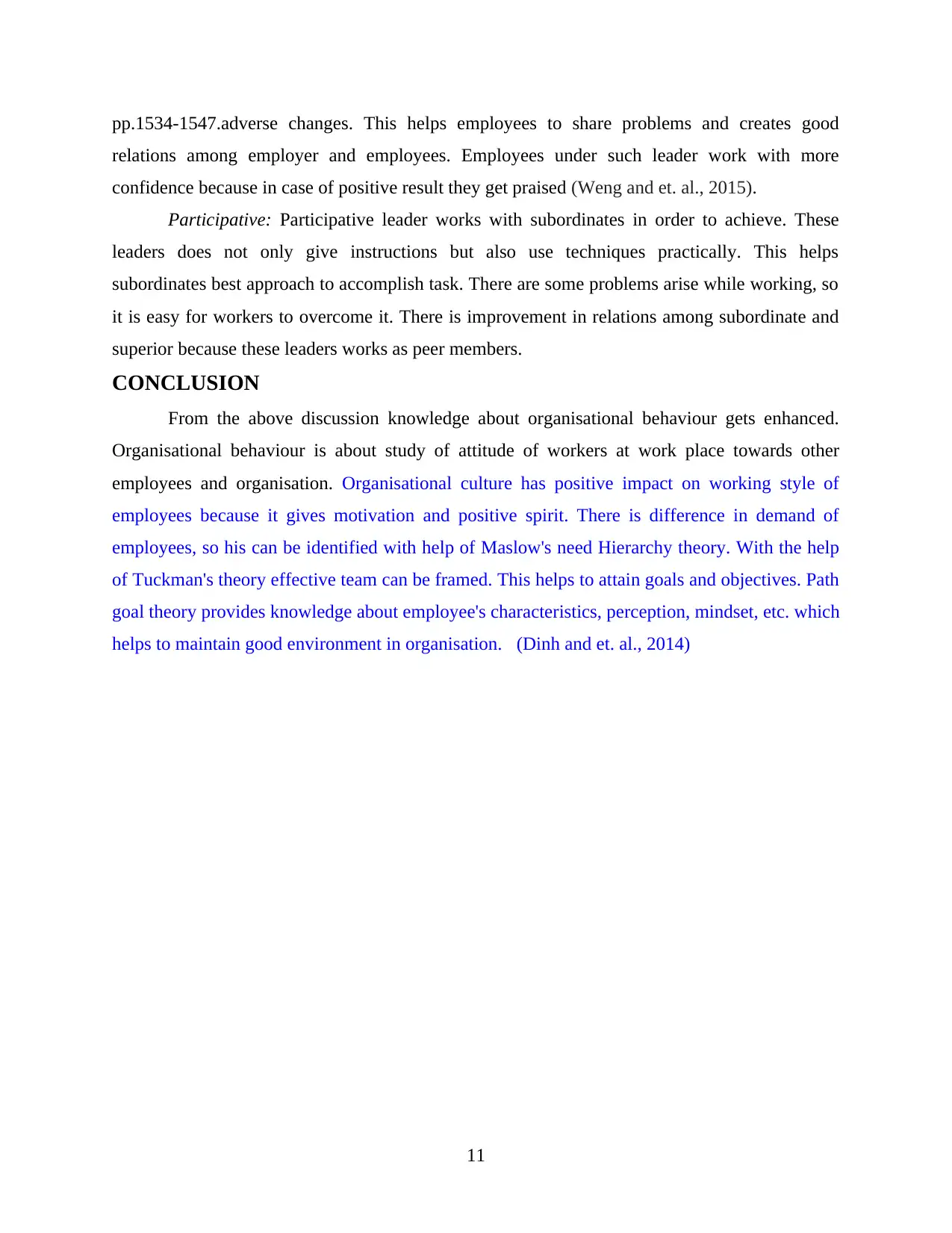
pp.1534-1547.adverse changes. This helps employees to share problems and creates good
relations among employer and employees. Employees under such leader work with more
confidence because in case of positive result they get praised (Weng and et. al., 2015).
Participative: Participative leader works with subordinates in order to achieve. These
leaders does not only give instructions but also use techniques practically. This helps
subordinates best approach to accomplish task. There are some problems arise while working, so
it is easy for workers to overcome it. There is improvement in relations among subordinate and
superior because these leaders works as peer members.
CONCLUSION
From the above discussion knowledge about organisational behaviour gets enhanced.
Organisational behaviour is about study of attitude of workers at work place towards other
employees and organisation. Organisational culture has positive impact on working style of
employees because it gives motivation and positive spirit. There is difference in demand of
employees, so his can be identified with help of Maslow's need Hierarchy theory. With the help
of Tuckman's theory effective team can be framed. This helps to attain goals and objectives. Path
goal theory provides knowledge about employee's characteristics, perception, mindset, etc. which
helps to maintain good environment in organisation. (Dinh and et. al., 2014)
11
relations among employer and employees. Employees under such leader work with more
confidence because in case of positive result they get praised (Weng and et. al., 2015).
Participative: Participative leader works with subordinates in order to achieve. These
leaders does not only give instructions but also use techniques practically. This helps
subordinates best approach to accomplish task. There are some problems arise while working, so
it is easy for workers to overcome it. There is improvement in relations among subordinate and
superior because these leaders works as peer members.
CONCLUSION
From the above discussion knowledge about organisational behaviour gets enhanced.
Organisational behaviour is about study of attitude of workers at work place towards other
employees and organisation. Organisational culture has positive impact on working style of
employees because it gives motivation and positive spirit. There is difference in demand of
employees, so his can be identified with help of Maslow's need Hierarchy theory. With the help
of Tuckman's theory effective team can be framed. This helps to attain goals and objectives. Path
goal theory provides knowledge about employee's characteristics, perception, mindset, etc. which
helps to maintain good environment in organisation. (Dinh and et. al., 2014)
11
Paraphrase This Document
Need a fresh take? Get an instant paraphrase of this document with our AI Paraphraser
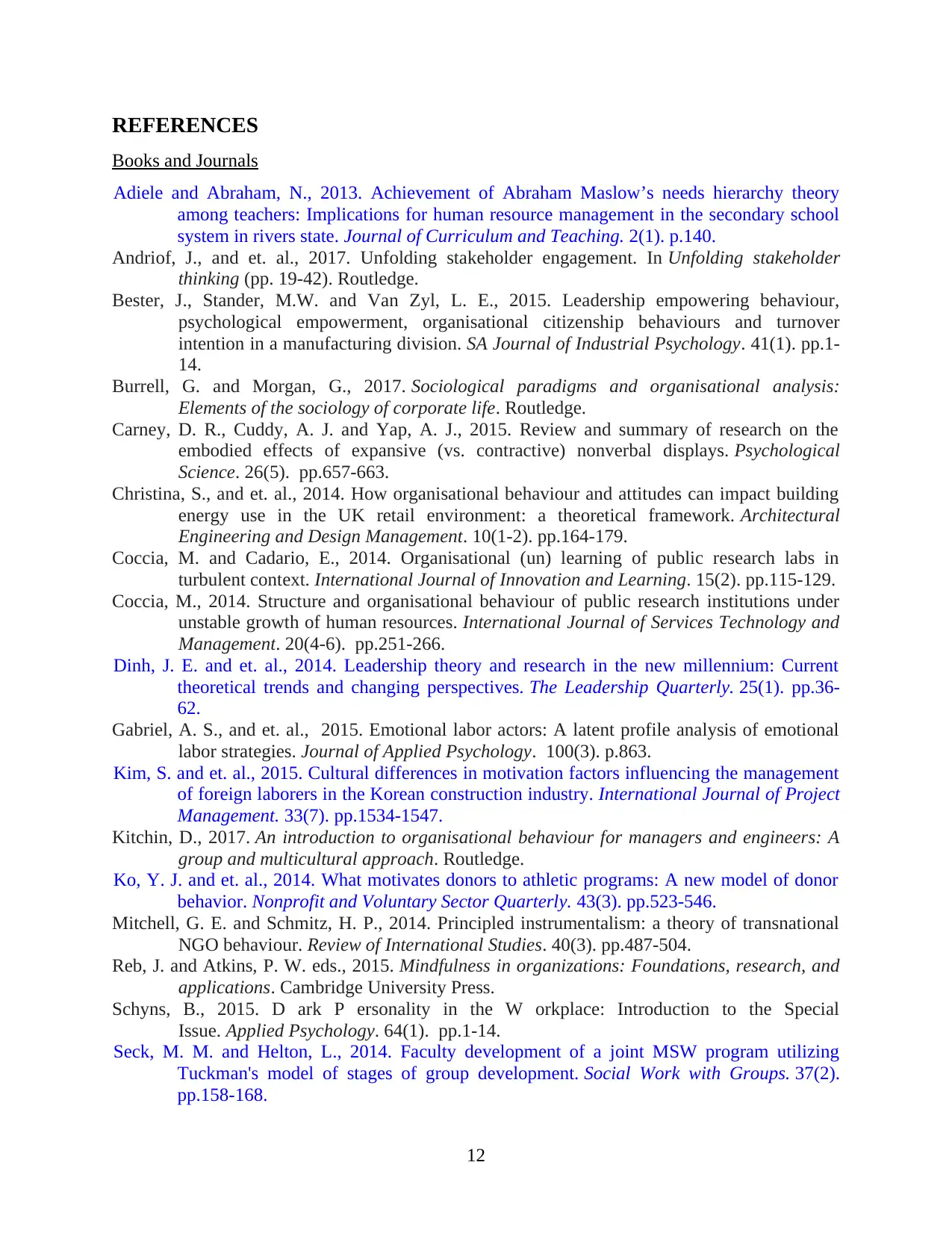
REFERENCES
Books and Journals
Adiele and Abraham, N., 2013. Achievement of Abraham Maslow’s needs hierarchy theory
among teachers: Implications for human resource management in the secondary school
system in rivers state. Journal of Curriculum and Teaching. 2(1). p.140.
Andriof, J., and et. al., 2017. Unfolding stakeholder engagement. In Unfolding stakeholder
thinking (pp. 19-42). Routledge.
Bester, J., Stander, M.W. and Van Zyl, L. E., 2015. Leadership empowering behaviour,
psychological empowerment, organisational citizenship behaviours and turnover
intention in a manufacturing division. SA Journal of Industrial Psychology. 41(1). pp.1-
14.
Burrell, G. and Morgan, G., 2017. Sociological paradigms and organisational analysis:
Elements of the sociology of corporate life. Routledge.
Carney, D. R., Cuddy, A. J. and Yap, A. J., 2015. Review and summary of research on the
embodied effects of expansive (vs. contractive) nonverbal displays. Psychological
Science. 26(5). pp.657-663.
Christina, S., and et. al., 2014. How organisational behaviour and attitudes can impact building
energy use in the UK retail environment: a theoretical framework. Architectural
Engineering and Design Management. 10(1-2). pp.164-179.
Coccia, M. and Cadario, E., 2014. Organisational (un) learning of public research labs in
turbulent context. International Journal of Innovation and Learning. 15(2). pp.115-129.
Coccia, M., 2014. Structure and organisational behaviour of public research institutions under
unstable growth of human resources. International Journal of Services Technology and
Management. 20(4-6). pp.251-266.
Dinh, J. E. and et. al., 2014. Leadership theory and research in the new millennium: Current
theoretical trends and changing perspectives. The Leadership Quarterly. 25(1). pp.36-
62.
Gabriel, A. S., and et. al., 2015. Emotional labor actors: A latent profile analysis of emotional
labor strategies. Journal of Applied Psychology. 100(3). p.863.
Kim, S. and et. al., 2015. Cultural differences in motivation factors influencing the management
of foreign laborers in the Korean construction industry. International Journal of Project
Management. 33(7). pp.1534-1547.
Kitchin, D., 2017. An introduction to organisational behaviour for managers and engineers: A
group and multicultural approach. Routledge.
Ko, Y. J. and et. al., 2014. What motivates donors to athletic programs: A new model of donor
behavior. Nonprofit and Voluntary Sector Quarterly. 43(3). pp.523-546.
Mitchell, G. E. and Schmitz, H. P., 2014. Principled instrumentalism: a theory of transnational
NGO behaviour. Review of International Studies. 40(3). pp.487-504.
Reb, J. and Atkins, P. W. eds., 2015. Mindfulness in organizations: Foundations, research, and
applications. Cambridge University Press.
Schyns, B., 2015. D ark P ersonality in the W orkplace: Introduction to the Special
Issue. Applied Psychology. 64(1). pp.1-14.
Seck, M. M. and Helton, L., 2014. Faculty development of a joint MSW program utilizing
Tuckman's model of stages of group development. Social Work with Groups. 37(2).
pp.158-168.
12
Books and Journals
Adiele and Abraham, N., 2013. Achievement of Abraham Maslow’s needs hierarchy theory
among teachers: Implications for human resource management in the secondary school
system in rivers state. Journal of Curriculum and Teaching. 2(1). p.140.
Andriof, J., and et. al., 2017. Unfolding stakeholder engagement. In Unfolding stakeholder
thinking (pp. 19-42). Routledge.
Bester, J., Stander, M.W. and Van Zyl, L. E., 2015. Leadership empowering behaviour,
psychological empowerment, organisational citizenship behaviours and turnover
intention in a manufacturing division. SA Journal of Industrial Psychology. 41(1). pp.1-
14.
Burrell, G. and Morgan, G., 2017. Sociological paradigms and organisational analysis:
Elements of the sociology of corporate life. Routledge.
Carney, D. R., Cuddy, A. J. and Yap, A. J., 2015. Review and summary of research on the
embodied effects of expansive (vs. contractive) nonverbal displays. Psychological
Science. 26(5). pp.657-663.
Christina, S., and et. al., 2014. How organisational behaviour and attitudes can impact building
energy use in the UK retail environment: a theoretical framework. Architectural
Engineering and Design Management. 10(1-2). pp.164-179.
Coccia, M. and Cadario, E., 2014. Organisational (un) learning of public research labs in
turbulent context. International Journal of Innovation and Learning. 15(2). pp.115-129.
Coccia, M., 2014. Structure and organisational behaviour of public research institutions under
unstable growth of human resources. International Journal of Services Technology and
Management. 20(4-6). pp.251-266.
Dinh, J. E. and et. al., 2014. Leadership theory and research in the new millennium: Current
theoretical trends and changing perspectives. The Leadership Quarterly. 25(1). pp.36-
62.
Gabriel, A. S., and et. al., 2015. Emotional labor actors: A latent profile analysis of emotional
labor strategies. Journal of Applied Psychology. 100(3). p.863.
Kim, S. and et. al., 2015. Cultural differences in motivation factors influencing the management
of foreign laborers in the Korean construction industry. International Journal of Project
Management. 33(7). pp.1534-1547.
Kitchin, D., 2017. An introduction to organisational behaviour for managers and engineers: A
group and multicultural approach. Routledge.
Ko, Y. J. and et. al., 2014. What motivates donors to athletic programs: A new model of donor
behavior. Nonprofit and Voluntary Sector Quarterly. 43(3). pp.523-546.
Mitchell, G. E. and Schmitz, H. P., 2014. Principled instrumentalism: a theory of transnational
NGO behaviour. Review of International Studies. 40(3). pp.487-504.
Reb, J. and Atkins, P. W. eds., 2015. Mindfulness in organizations: Foundations, research, and
applications. Cambridge University Press.
Schyns, B., 2015. D ark P ersonality in the W orkplace: Introduction to the Special
Issue. Applied Psychology. 64(1). pp.1-14.
Seck, M. M. and Helton, L., 2014. Faculty development of a joint MSW program utilizing
Tuckman's model of stages of group development. Social Work with Groups. 37(2).
pp.158-168.
12
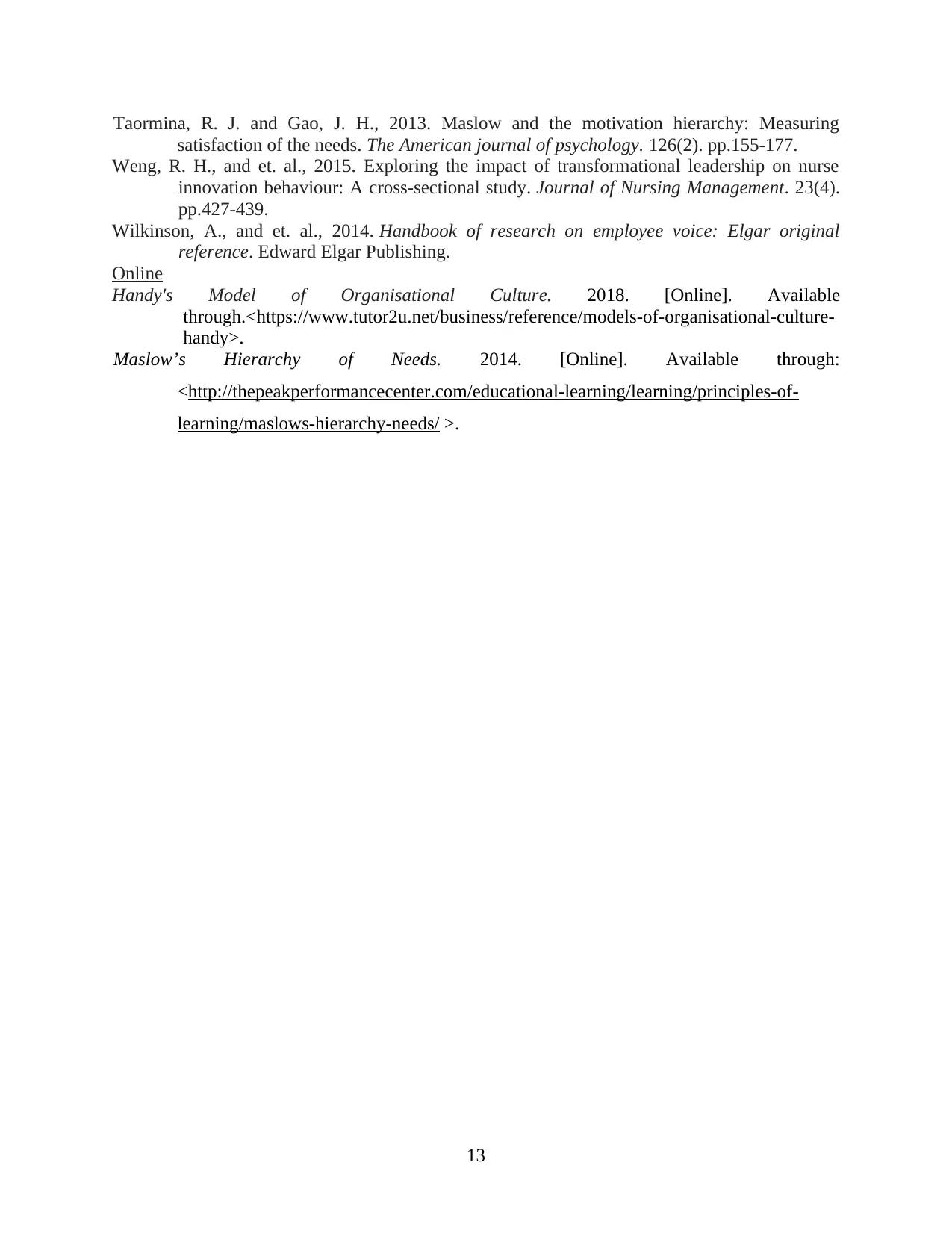
Taormina, R. J. and Gao, J. H., 2013. Maslow and the motivation hierarchy: Measuring
satisfaction of the needs. The American journal of psychology. 126(2). pp.155-177.
Weng, R. H., and et. al., 2015. Exploring the impact of transformational leadership on nurse
innovation behaviour: A cross‐sectional study. Journal of Nursing Management. 23(4).
pp.427-439.
Wilkinson, A., and et. al., 2014. Handbook of research on employee voice: Elgar original
reference. Edward Elgar Publishing.
Online
Handy's Model of Organisational Culture. 2018. [Online]. Available
through.<https://www.tutor2u.net/business/reference/models-of-organisational-culture-
handy>.
Maslow’s Hierarchy of Needs. 2014. [Online]. Available through:
<http://thepeakperformancecenter.com/educational-learning/learning/principles-of-
learning/maslows-hierarchy-needs/ >.
13
satisfaction of the needs. The American journal of psychology. 126(2). pp.155-177.
Weng, R. H., and et. al., 2015. Exploring the impact of transformational leadership on nurse
innovation behaviour: A cross‐sectional study. Journal of Nursing Management. 23(4).
pp.427-439.
Wilkinson, A., and et. al., 2014. Handbook of research on employee voice: Elgar original
reference. Edward Elgar Publishing.
Online
Handy's Model of Organisational Culture. 2018. [Online]. Available
through.<https://www.tutor2u.net/business/reference/models-of-organisational-culture-
handy>.
Maslow’s Hierarchy of Needs. 2014. [Online]. Available through:
<http://thepeakperformancecenter.com/educational-learning/learning/principles-of-
learning/maslows-hierarchy-needs/ >.
13
1 out of 15
Related Documents
Your All-in-One AI-Powered Toolkit for Academic Success.
+13062052269
info@desklib.com
Available 24*7 on WhatsApp / Email
![[object Object]](/_next/static/media/star-bottom.7253800d.svg)
Unlock your academic potential
© 2024 | Zucol Services PVT LTD | All rights reserved.





